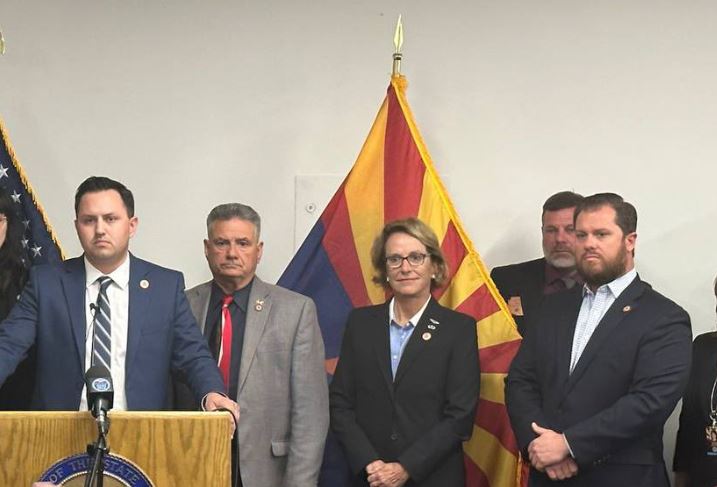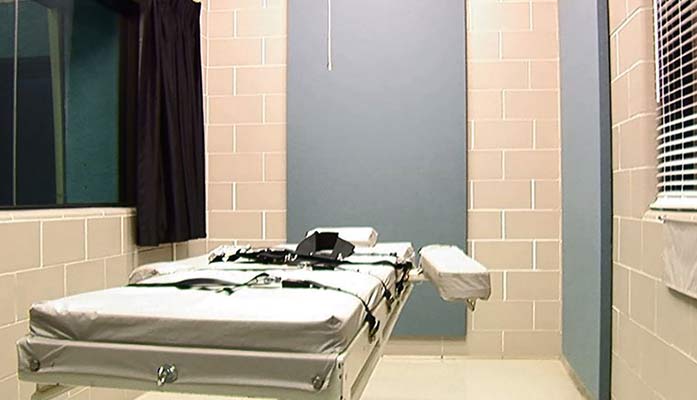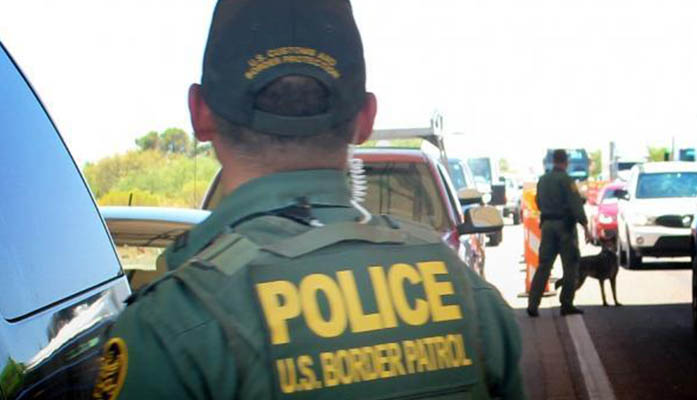
by Daniel Stefanski | Mar 16, 2023 | News
By Daniel Stefanski |
As the threat of a Ranked Choice Voting ballot measure grows, Arizona lawmakers are increasing their warnings about the future of elections under this proposed new system.
This week, the Arizona Freedom Caucus released a statement to note its members’ extreme disapproval over the prospects of Ranked Choice Voting governing future elections: “The Arizona Freedom Caucus unequivocally opposes Ranked Choice Voting. The problems with RCV are numerous and well-documented, the least of which is the erosion of the one-citizen, one-vote principle which has long guided American elections. In jurisdictions where it has been tried, RCV has caused the exact outcomes which election integrity legislators have sought to eliminate, such as disenfranchisement, voter confusion, delayed results, and the unnecessary complication of our elections process.”
The Caucus announced its formal support for the passage of HB 2552 and SB 1265.
HB 2552, sponsored by Representative Austin Smith, passed the House on March 1 with a 31-28-1 vote. On February 28, SB 1265, sponsored by Senator Anthony Kern, passed the Senate with a 16-13-1 vote.
Ranked Choice Voting is most prominently featured in Alaska, where voters rank their preferences in each election until one candidate receives more than 50% of the vote. If RCV were to be successfully pushed by special interest groups in the 2024 election, Arizona’s primary and general elections would be effectively eliminated in favor of this new progressive system.
According to the Pew Research Center, “62 jurisdictions nationwide have adopted the voting method” – and more are on the way in the near future, including the attempt to airdrop it into Arizona.
Representative Smith issued the following statement in the Arizona Freedom Caucus’s press release: “Ranked Choice Voting is an unmitigated disaster as seen recently in Alaska and local municipalities races. Arizona—Maricopa County specifically—already has a bad record of voter tabulation and counting process. Between voter confusion, high rates of ballot exhaustion and the difficulty of tabulating the results, RCV increases voter disenfranchisement, distrust in the process and deters candidates from taking stances on issues important to every Arizonan. The bottom line is RCV is a scam that destroys integrity in elections.”
Senator Kern also provided a quote for the release, saying, “RCV may not always result in the candidate with the most first-choice votes winning the election. I am aware that there are groups in Arizona advocating for RCV, but this will only lead to chaos, and we must ensure that our constituents have easy and fair access to the ballot box.”
Another Freedom Caucus member, Senator Justine Wadsack, also weighed in on the Ranked Choice Voting debate: “RCV introduces voter disenfranchisement perpetrated by its ‘exhausted ballots’ because the effect is the silencing of significant portions of the electorate. Exhausted ballots are those that do not rank any continuing candidate, contain an overvote at the highest continuing ranking, or contain two or more sequential skipped rankings before its highest continuing ranking.”
The Arizona Freedom Caucus, along with other Republican members of the State Senate and House, hosted a press conference on Wednesday, at 11:00am, in the Senate Appropriations Committee Hearing Room to announce their formal opposition to Ranked Choice Voting. These efforts take place under the unfriendly shadow of the Ninth Floor of the Arizona Executive Tower, where the legislation has little chance of being signed into law by Democrat Governor Katie Hobbs.
Daniel Stefanski is a reporter for AZ Free News. You can send him news tips using this link.

by Daniel Stefanski | Mar 16, 2023 | News
By Daniel Stefanski |
The Maricopa County Attorney would like a word with the Arizona Governor after her decision to disregard the execution order for a condemned man on the state’s death row.
This week, Maricopa County Attorney Rachel Mitchell filed a writ of mandamus with the Arizona Supreme Court to “ensure Governor Katie Hobbs and Arizona Department of Corrections, Rehabilitation, and Reentry (ADCRR) director Ryan Thornell adhere to their oaths of office to enforce the death penalty and comply with victims’ constitutional and statutory rights.” The question presented before the state’s high court is whether the Governor and ADCRR Director “are threatening to proceed without legal authority and failing to perform a duty – the lawful execution of Aaron Brian Gunches on April 6, 2023 – as required by law.”
After filing the amicus with the court, Mitchell released the following statement: “As County Attorney, I took an oath to uphold the US Constitution and the constitution and laws of the State of Arizona. These recognize that both the victim and the accused have rights. Our brief recognizes and supports the right of victims to a “prompt and final conclusion of the case.” It also gives the defendant notice of the recent US Supreme Court decision, even though we do not believe it applies in his case. What is not at issue is what the sentence is for his crime.”
The Maricopa County Attorney’s action follows Democrat Governor Hobbs’ earlier announcement that she would not be fulfilling the execution date for Gunches after the Arizona Supreme Court issued an execution warrant for April 6, 2023. The Gunches saga predates to the previous Ducey-Brnovich administrations, which came to an end on January 2, 2023. Former Attorney General Mark Brnovich had requested the warrant of execution for Gunches in December 2022.
In Mitchell’s filing before the court, she highlights a 1915 response from the same judicial body to a warden “who refused to comply with, and carry out, the order and directors of this Court to execute the sentence of death” in State ex rel. Jones v. Sims. The Court wrote: “Of course, it must be understood that men’s opinions and wishes cannot be substituted and made to take the place of the law; that this is a government of laws, and not of men, and that those persons whom the people have chosen to execute the laws must do so, however disagreeable or repugnant to their wishes it may be. It is not a jealousy of our processes that calls forth this expression, but [jealousy] of the law as it exists. The people and their representatives make the laws, and their observation and enforcement is the only sure test of loyalty and certain guaranty of the perpetuity of our government.”
Mitchell argues that “the Governor is bound by the Constitution and statutes to carry out executions after this court issues a warrant,” that “the Arizona Constitution limits the Governor’s exercise of Executive Clemency power,” and that “Governor Hobbs’s unilateral decision to grant a de facto reprieve violates the victim’s constitutional right to a prompt and final conclusion.”
Governor Hobbs’ decision to unilaterally cancel the court-ordered execution of Gunches coincides with her installation of a Death Penalty Independent Review Commissioner to review and provide “transparency into the ADCRR lethal injection drug and gas chamber chemical procurement process, execution protocols, and staffing considerations including training experience.” The Maricopa County Attorney’s brief contends that “this Court further found that Governor Hobbs’ Commissioner review, by itself, ‘does not demonstrate the State’s inability to lawfully carry out the execution.’”
Earlier this month, Arizona Senate President Warren Petersen expressed extreme displeasure with Governor Hobbs’ controversial decision to withhold justice in this case. Petersen provided the following quote to AZ Free News when asked for a reaction to Maricopa County Attorney Mitchell’s recent filing in court: “I applaud the County Attorney for supporting justice and victims. The Senate and House will be writing an Amicus brief in favor of justice as well. It is disturbing to see that our current Governor and Attorney General are unwilling to enforce the law and siding with the most vile individuals of society.”
Daniel Stefanski is a reporter for AZ Free News. You can send him news tips using this link.

by Corinne Murdock | Mar 15, 2023 | News
By Corinne Murdock |
Sen. Mark Kelly (D-AZ) suggested that the government should coordinate censorship with social media companies during a conference call with federal agencies on Sunday.
Kelly asked the Federal Reserve, Treasury Department, and the Federal Deposit and Information Corporation (FDIC) about the feasibility of their agencies working with social media companies to censor information in order to prevent a run on the banks. The senator posed the question within the context of the Silicon Valley Bank bailout over the weekend.
The bank failed due to a massive run following a troubling announcement from its parent company, SVB Financial Group, last week. Depositors panicked en masse after learning that the company was attempting to sell $1.75 billion worth of shares to make up for the $1.8 billion hit on $21 billion of assets sold. The mass withdrawals caused the bank to become insolvent.
Kelly sits on the Joint Economic Committee, chaired by Sen. Don Beyer (D-VA). Other members on the committee are Sens. Martin Heinrich (D-NM), vice chairman; Amy Klobuchar (D-MN); Margaret Wood Hassan (D-NH); Peter Welch (D-VT); John Fetterman (D-PA); Mike Lee (R-UT), ranking member; Tom Cotton (R-AR); Eric Schmitt (R-MO); and J.D. Vance (R-OH).
Their next committee hearing is on Thursday.
Kelly also sits on the Armed Services Committee, chairing the Airland Subcommittee, while also serving on the subcommittees for Emerging Threats and Capabilities, Readiness and Management Support, and Subcommittee on Strategic Forces; Energy and Natural Resources Committee; Environment and Public Works Committee; and the Special Committee on Aging.
About 200 people were on the conference call, including a bipartisan mix of Congressmen and their staffers. Senate President Chuck Schumer (D-NY) led the conference call, according to Rep. Thomas Massie (R-KY-04).
Rep. Lauren Boebert (R-CO-03) also referenced Kelly in a tweet. Boebert claimed that Kelly, whom she referred to only as “a member,” asked if the Federal Reserve, Treasury Department, and FDIC were reaching out to Facebook and Twitter to monitor misinformation and bad actors.
“And this administration AGAIN just committed the federal government to interfere with free speech. Unacceptable!” tweeted Boebert.
Prior to confirming that Kelly was the unnamed member of Congress who apparently encouraged the federal agencies to coordinate censorship efforts with social media companies, Massie identified him only as “a Democrat Senator.” Massie noted that Kelly had asked whether there was a censorship program in place that could prevent a run on the banks.
Neither Massie or Boebert included the three federal agencies’ answers.
Rep. Dan Bishop (R-NC-08) confirmed Massie’s identification of Kelly with House Speaker Kevin McCarthy (R-CA-20), as reported in Public.
Corinne Murdock is a reporter for AZ Free News. Follow her latest on Twitter, or email tips to corinne@azfreenews.com.

by Corinne Murdock | Mar 15, 2023 | News
By Corinne Murdock |
This week, Gov. Katie Hobbs departed for Oman to officiate a pact made under the former administration with the Middle Eastern country.
In a press release, Hobbs said that the partnership provided greater readiness for Arizonan forces. Oman has a population of nearly four million people, bordering Saudi Arabia, the United Arab Emirates, and Yemen. The partnership formed under former Gov. Doug Ducey last October.
“This partnership is grounded in our Arizona National Guard military relationship but expands to other sectors of the government bringing valuable interoperability opportunities for both countries,” said Hobbs.
Kerry Muehlenbeck, Arizona National Guard adjutant general and Department of Emergency and Military Affairs director, added that the partnership would strengthen both country’s forces.
The Arizona National Guard established the partnership last October through the Department of Defense National Guard Bureau State Partnership Program. The program partners states with nations in order to bridge international civil-military affairs; over 90 nations have a match in the states. This year marks the program’s 30th anniversary.
Arizona partners with one other country through the program, the Republic of Kazakhstan, a relationship it has held since 1993.
Daniel Hokanson, chief of the National Guard Bureau, said that the program also allows soldiers to visit other countries and understand problem-solving skills from foreign soldiers.
“To look at the environment that they operate in, and to really see, in many cases, the same problems — just approached from a different angle,” said Hokanson. “We learn a lot in those countries and in those interactions that we bring back to make our organizations better, and I like to think vice versa.”
Several days after announcing the partnership, the University of Arizona (UArizona) Eller Executive Education announced a partnership with the Royal Academy of Management in Oman for a program, “Developing Leaders and Future Foresight.” Although the press release was issued several days after the state announced the National Guard partnership, UArizona’s initial press release was dated for the same day as the state’s announcement.
UArizona’s partner program with Oman is designed to develop and equip national leaders to fulfill Oman’s “Vision 2040,” a plan to become a developed country by 2040.
Oman is one of the top oil exporters. They also export liquified natural gas.
Hobbs attended the formal signing ceremony on Monday, and is scheduled to depart from Oman on Wednesday. Oman leadership is scheduled to visit Arizona in May.
Corinne Murdock is a reporter for AZ Free News. Follow her latest on Twitter, or email tips to corinne@azfreenews.com.

by Terri Jo Neff | Mar 15, 2023 | News
By Terri Jo Neff |
A top U.S. Border Patrol union representative says the situation along the southwest border “is spinning out of control everywhere,” with the number of illegal border crossings showing no sign of falloff while agency staffing in the field is at dangerously low rates.
“It’s just overwhelming right now,” USBP agent Art Del Cueto told KFYI’s James T. Harris earlier this week. Del Cueto serves as vice president of the National Border Patrol Council (NBPC) and president of NBPC Local 2544 in Tucson.
The staffing problem had become so bad that NBPC publicized the situation earlier this week, reporting only two agents were covering a 50-mile section of border. There would typically have been 15 to 20 agents assigned to the area, according to NBPC.
USBP agents have long complained about being dangerously outmanned in the field. Several agents have been injured just in the Cochise County area over the last year, including an agent assigned to USBP Tucson Sector who was hospitalized March 4 after being attacked as she arrested an undocumented migrant.
The migrant was eventually subdued and taken into custody when other agents arrived on scene.
“Our agents face extreme risks in the field, and those who bring them harm will be brought to justice,” USBP Tucson Sector Chief John Modlin said a few days later. Even USBP Chief Raul Ortiz was forced to weigh in on the situation after the agent’s early morning attack made national headlines.
The March 4 attack drew an immediate reaction from Cochise County Sheriff Mark Dannels, who promised to have the attacker charged in state court if federal prosecutors dropped the ball.
But while USBP command staffers used the attacked agent’s recovery to deflect from the dangerous situation, Del Cueto contends the ongoing practice of pulling field agents from patrol duties to be used instead to process large groups of border crossers in another area demonstrates the lack of sufficient staffing.
Different areas along the nearly 2,000 mile border between the U.S. and Mexico have different challenges, Del Cueto told Harris. For instance, the USBP Tucson Sector is responsible for a mostly remote and rural terrain.
As a result, the area leads the U.S. with a disturbingly high number of “gotaways,” the name given to undocumented border crossers who evade apprehension and do not turn themselves in for immigration processing.
According to Del Cueto, the cartels know of USBP’s staffing challenges. As a result, they realize getting agents to chase down crossers in certain remote areas provides a distraction which allows drugs or higher paying crossers to be moved through other areas.
Staffing issues are forcing agents in the field to wait longer for transport vehicles to arrive, while at other times they must do the processing and transporting themselves. This removes boots on the ground, and “that’s when you start seeing a lot of other groups come through,” he explained.
Del Cueto calls it a “cop out” when people complain USBP and its parent agency Customs and Border Protection are not asking U.S. Department of Homeland Security to spend more money for technology along the border.
“Technology is fantastic, it helps us see where the groups are but at the end you need the boots on the ground to actually make the arrests,” he told Harris.
The cartels are very organized and “are not dumb,” Del Cueto said, adding that they will continue to do things “as long as they kept seeing this Administration not have any true consequences for these people committing crimes.”
“The agents that are still here in Tucson, they have their hands full,” Del Cueto said. “Their backup is far away. They are having a really hard time.”
Terri Jo Neff is a reporter for AZ Free News. Follow her latest on Twitter, or send her news tips here.

by Daniel Stefanski | Mar 14, 2023 | Education, News
By Daniel Stefanski |
Arizona Legislative Republicans are working overtime to protect young students from what they could read or hear in their district schools, though these efforts are opposed by Democrats and have little chance at becoming law.
SB 1323, sponsored by Senator Jake Hoffman, “classifies, as a class 5 felony, a violation of the prohibition on a public school referring students to or using any sexually explicit material in any manner,” according to the purpose provided by the State Senate.
The prohibition of “sexually explicit material” is found in ARS 15-120: “….includes textual, visual or audio materials or materials accessed via any other medium that depict any of the following – sexual conduct, sexual excitement, or ultimate sexual acts.” There are exemptions from this prohibition, which include the school requiring written parental consent for the student to be referred to or use the materials.
As with most pieces of legislation dealing with children’s education and schools, the vote in the Senate came down along party lines. 16 Republicans voted in favor, while 13 Democrats vote against (Senator Juan Mendez did not vote).
The bill previously passed the Senate Judiciary and the Rules Committees with partisan 4-3 votes.
SB 1323 provoked a heated debate on both sides of the aisle when members of the Senate cast their votes. Democrat Senator Anna Hernandez bemoaned what she perceived as the lack of due process for the bill, arguing that there was no difference between a teacher presenting the materials to kindergarteners or high school seniors, or that the legislature was not making a clear line for teachers who were intentionally versus unintentionally making the material available to students. She stated that the state was taking a “huge step forward to criminalize the speech of a teacher who refers to a book,” and she wondered aloud why Arizona has a teacher shortage with these kinds of bills being proposed by Republican legislators.
Democrat Senator Christine Marsh agreed with her colleague, making the case that the language in the existing law was already incredibly vague on prohibitions, and that the added criminal penalty in Hoffman’s proposal was a huge problem. She echoed Senator Hernandez’s comments about the teacher shortage in the Grand Canyon State, saying that “educators are already finding the working and learning conditions in Arizona to be untenable,” and that “mistakes could expose a person to serious felony or prison time.”
Republican Senator Anthony Kern took strong exception to what he was hearing from Democrats, claiming that this bill protects children and that “teachers are leaving because they are being intimidated by the left for their Christian values.” He noted that “it is not naïve to think that our children are being targeted by our current school board education system to explicit pornography and explicit materials.”
Democrat Senator Mitzi Epstein pushed back against the Republicans’ assertions that explicit pornography was being shown to students in Arizona public schools, saying that Arizona “already has laws on the books against showing pornography to children.” She called the bill “overreach” and “ridiculous.”
Bill sponsor, Jake Hoffman told his fellow colleagues that his bill was about “stopping the sexualization of Arizona’s children,” and admitted that the definition of “sexually explicit” was pulled from the obscenity section of the U.S. Criminal Code, which was adopted in the 1960s – and hasn’t been amended since 2001. He revealed that when the Legislature previously considered a bill to enshrine into law the definitions of “sexually explicit materials,” he had to obtain permission from DPS to show pictures from a book for ten-year-olds in a committee hearing (since the proceedings were being broadcasted). He blasted Democrats for their votes against the bill, saying that “every parent in Arizona should be ashamed of the red (no) votes,” and he predicted that Governor Hobbs would aid “in the sexualization of children in Arizona” by vetoing this legislation.
Senator Sonny Borrelli presented a thought-provoking question from a constituent for his colleagues to consider when casting their votes: “Why is talking about sex with adults at work considered sexual harassment but talking with kindergarteners and middle school and grammar school kids considered necessary?” He called the Democrats’ stance on this proposal a “double standard” that was “completely off the charts.”
Senators Anthony Kern, Janae Shamp, Justine Wadsack, and Representatives Joseph Chaplik and Jacqueline Parker co-sponsored Hoffman’s legislation. Representatives from the Center for Arizona Policy and Arizona Free Enterprise Club supported the bill, and representatives from the Arizona Education Association, Save Our Schools Arizona, American Civil Liberties Union of AZ, and AZ Attorneys for Criminal Justice opposed its movement through the legislative process.
SB 1323 now awaits its fate in the Arizona House of Representatives.
Daniel Stefanski is a reporter for AZ Free News. You can send him news tips using this link.






